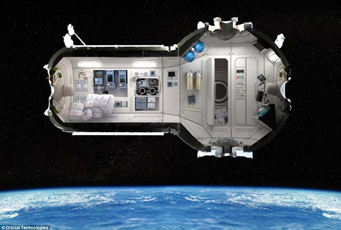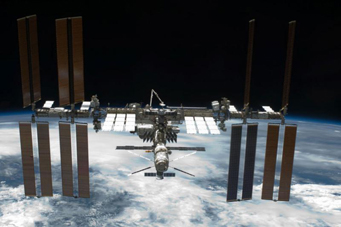A few years from now, when you’re floating in a space hotel many miles from Earth, you might want to order some coffee. And PayPal wants to make sure you don’t have to pay in cash.
Writing about astronomy doesn’t usually entail discussing commerce. This week is an exception. PayPal announced at a press conference yesterday a new initiative to explore and ultimately develop the first interplanetary money transfer platform.
Yes, you read that right: interplanetary.
The initiative, titled PayPal Galactic, is partnering with the Space Tourism Society and the Search for Extraterrestrial Intelligence (SETI) Institute, so it’s easy to think of two potential reasons you might want to transfer money in space: ordering room service aboard a space hotel and paying off aliens.

The Orbital Technologies "space hotel" is scheduled to open in 2016.
Orbital Technologies
Alas for the aliens, it’s space tourism that’s the focus here. Virgin Galactic is on track to launch its first commercial spaceflight this Christmas Day. The flight will only last about 2½ hours, so the six passengers will likely be too busy snapping photos and enjoying four-plus minutes of weightlessness to purchase souvenirs from a suborbital version of SkyMall. Still, other ventures abound: XCOR Aerospace is developing suborbital spaceflight similar to Virgin Galactic, SpaceX is already resupplying the International Space Station and aims to one day fly manned spaceflights, and Orbital Technologies (the Russian aerospace firm, not the American company that goes by the same name) promises an orbiting space hotel by 2016.
To be fair, space tourism isn’t quite “space for the rest of us.” Here’s what a ticket with these ventures currently costs:
- Virgin Galactic (suborbital): $250,000
- XCOR Aerospace (suborbital): $95,000
- Orbital Technologies (space hotel): depending whom you ask (the company doesn’t list prices on its website), it’ll cost around $950,000 for a five-day visit (about $800,000 to get there, plus another $150,000 for a relatively deluxe room and board)
- Space Adventures (ISS visit): $20 million to $40 million, at least in the past
- Space Adventures (Moon flyby): $100 million
David Marcus, president of PayPal, expects space flights to follow commercial aviation: a flight from New York City to L.A. cost $4,500 in 1935 ($80,000 in today’s dollars), but now it’s just $350. So a ticket on Virgin Galactic might go for just $1,000 a few decades from now. It’s not the “democratization of space” exactly, but it could eventually be the democratization of suborbital flights.

Astronauts aboard the International Space Station have limited internet access. Creating a public internet for interplanetary space would be a challenge.
NASA
Before any of that can happen, PayPal and its partners have a few hurdles to overcome. For one, space doesn’t have public internet yet (though ISS crew have intermittent personal web access through a local area network) — satellites generally communicate via links with accessible ground stations. So developing a wide-ranging network for money transfer will probably have first priority.
But which currency do you use when no government owns space (at least, not yet)? Will there eventually be a standard space currency like the Federation credits used in Star Trek?
And what about money laundering and other fraud? “The people who hit [PayPal] the hardest are the people trying to game it,” says Anuj Nayar, PayPal’s senior director of communications. “If there’s a loophole, we need to ensure it’s been fixed before we move forward.”
Nayar cautions that these questions are big, and he doesn’t think they’re going to be solved in a couple of months. In other words, the first Virgin Galactic passengers won’t use PayPal to order space jewelry while in flight.

Alan Shepard may have been the first to play golf on the Moon, but PayPal is betting he won't be the last.
Pat Rawlings / PayPal
Appealing as it is, space tourism might not dominate space commerce in the long run. As I’ve reported in months past, more than one company is exploring asteroid mining, and that technology could catch up to the hype within a few years. If the potential miners stick to the plan of keeping their goods in space for building there, instead of bringing them back down to Earth, customers might need a space-based money transfer system.
“To be very honest, once asteroid-mining technology has advanced to the point where it becomes economically feasible, the potential pay-offs are huge,” Nayar says. “We think it’s all going to happen.”
 0
0
Comments
You must be logged in to post a comment.